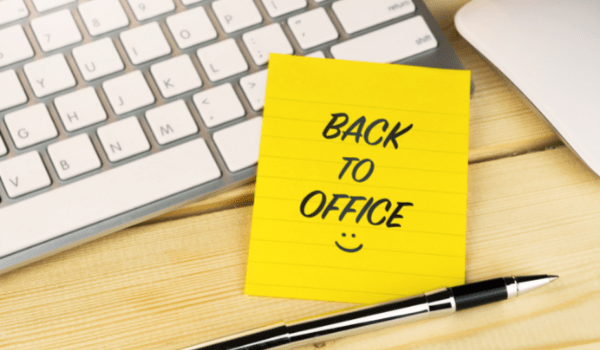While people typically tend to resent change, the past year and a half has been fraught with changes and challenges, which were unavoidable. We didn’t like the way the pandemic changed our lives, and now resent the changes yet again, as we start to return to work. But re-opening the physical workspace for the workforce is actually far more complicated than ensuring seamless remote work or work-from-home ever was. Companies are now endeavouring to incorporate new models into their work environments, with some continuing with the remote work model, others requiring employees to return to office and a significant number opting for a combination of both, that is a hybrid model. Whatever be the model, the safety of the employees has become top priority for leaders, who are considering scheduling changes and reconfiguring office spaces to allow for social distancing, addressing visitor and food policies and more. However, they should also be taking into account the mental health of their workers.
Re-entry anxiety
Most people experience anxiety and resistance when there is a need for change. While some people may think we’ll go back to the way things were before the pandemic, for most of us, it will not be the same ever again. There’s a complexity surrounding the emotional and psychological support of workers that needs to be addressed in re-entry plans. Since no one has done this before, no one really knows how to do it well.
Meanwhile, anxiety is at an all-time high. A national survey by Weber Shandwick and KRC Research shows that nearly half the employees are worried that employers will make them return to work before it is safe to do so. More than half are worried about the future of their company, and their job specifically.
I’ve had coaching clients recently express to me their concerns over:
• How safe their workplace will be
• How productive they will be in the office
• Feelings of increased stress
• Cost of going back to work, both financially and with time considerations
• The Delta variant and possible future variants considering the low rate of vaccinations in the country
• Co-workers who don’t share their views on the pandemic and health-safety measures
• Possible protocols at work regarding mask and vaccination mandates, and who will police this
There’s also anxiety around whether to look for a new job if one doesn’t want to return to the office and remote work is not an option.
An April 2021 survey by FlexJobs found that 60 per cent of women and 52 per cent of men would quit their jobs if they were not allowed to continue working remotely at least some of the time. Many people have established routines and lifestyle changes that they now prize in their work-from- home life, whether that’s increased productivity, regular exercise or spending more time with family. They feel like they would be giving up a lot in order to return to work, so they may be forced to look for other remote alternatives. Considering a career change at any time can be stressful, but it’s especially hard right now, given the volatile economic climate.
How to help reduce anxiety
Even though not much focus is currently being given to the individual’s mental well-being amidst return to work, we can change that by incorporating it into the re-entry plans.
Here are some core areas that company leaders should target:
1. Make employee well-being number one priority
People need reassurance, especially right now during these difficult times. The survey shows that 72 per cent of workers feel that their employers are putting safety above profit. Continue to demonstrate that commitment to your workers through your actions.
2. Communicate regularly
Research shows that employees who receive regular updates from their employers tend to trust their employers more and have faith in the system. Communication is very reassuring and helps manage anxiety, which invariably reflects in better work.
3. Follow the science
Companies should follow public health guidelines issued by the Centre, and inform employees how and when measures will be implemented, monitored and enforced.
4. Provide training and guidance
This is an ideal time train the workforce, even if it means taking external help. Coaches can be engaged to guide employees on ways to work in and lead hybrid teams. Now is the time to learn to manage wellbeing, and identify the signs of emotional distress early on.
5. Be flexible
Now is the time to listen to individual employee needs, and refrain from designing far-reaching rigid policies. Be generous with the employees and encourage them to take time off. Many organisations have given their employees leave to relax and distress, and these special leaves are independent of any other ‘time-off’ request. The advantage of such special breaks is that everyone takes the break at the same time, and therefore, there are no official e-mails and meeting requests piled up or waiting when they return.
6. Choose the right health insurance plan
The pandemic made most companies relook at their health-insurance plans, and become more generous in terms of incorporating mental-health components.
7. Educate yourself on the ROI of mental fitness in the workplace
When someone is anxious, it affects their capacity to be effective and efficient at work. Anxiety contributes to lack of focus, disengagement, fatigue, poor executive functioning, procrastination, ineffective communication and increase in self-medication, be it drugs, alcohol, tobacco or even binge-watching Netflix. This lack of performance directly affects the company’s bottom line. Therefore, it is essential for employees to be mentally healthy for the business to be successful.
How to support mental fitness in the workplace
So, how can you help your workplace become mentally fit? The first step is to help them recognise the emotional state they are in. Lessen it by simply identifying and naming it. Take a step back from the situation, remove some of the emotion and perhaps reframe the perspective with a different lens.
Building emotional intelligence also brings a sense of control to the situation. We tend to worry, or ruminate, but that habitual way of thinking is ineffective. It doesn’t push us toward a solution that makes us feel in control. Focus on the things that can control be controlled instead of those that cannot be controlled.
Empower yourself to take action on what you can do to manage your anxiety and stress.
If you cannot control something, breathe through it and let go. Diaphragmatic breathing calms down the racing mind and has an amazing impact on the body. When you start to feel stressed, take two minutes for this exercise:
1. Sit in a comfortable position. Lying down or sitting against a wall works as well.
2. Breathe in through your nose, concentrating on filling your belly completely with air.
3. Hold your breath for a count of six and exhale slowly through your mouth.
4. Repeat until you feel your body relax and your tension release.
Take this one step further with meditation. When you meditate, you are strengthening your prefrontal cortex, which is your rational brain – it allows you to think through situations and process things more effectively while reducing your heightened fight or flight responses.
Meditation and diaphragmatic breathing is a one-two punch for managing anxiety and building resilience.
Having a resilient workforce is more important now than ever before. There will be more disruption as we continue to see the pandemic situation change this year, and it’s not going to go away anytime soon. Now is the time to demonstrate agility and adaptability in your leadership.
While leaders craft re-entry plans, it’s important to keep the psychological health of employees on top of your mind. Not only will helping them deal with stress and anxiety affect your company’s bottom line, but it’s simply the right thing to do. Paying attention to all aspects of employee well-being will have positive consequences for years to come.
At a turning point in their personal or professional lives, the clients in season 2 of #ExperienceCoaching turned to ICF-credentialed coaches. Watch their stories to discover how turning to an ICF coach can help one find clarity and take the next step forward on one’s own journey
If you need support on your organisation’s and/or leader’s coaching journey, do contact us at ICF and our team of volunteers in India will be happy to help.
The International Coaching Federation (ICF) is the world’s largest organisation leading the global advancement of the coaching profession and fostering coaching’s role as an integral part of a thriving society. Founded in 1995, its 40,000-plus members located in more than 145 countries and territories work toward common goals of enhancing awareness of coaching and upholding the integrity of the profession through lifelong learning and upholding the highest ethical standards.
Through the work of its six unique family organisations, ICF empowers professional coaches, coaching clients, organisations, communities and the world through coaching.
In India, ICF is represented by six vibrant chapters, all led by volunteers — ICF Bengaluru, ICF Chennai, ICF Delhi NCR, ICF Mumbai, ICF Pune and ICF Hyderabad.
 The author, Jody Michael is an ICF Master Certified Coach (MCC) from Chicago, USA, who brings insights from over 20 years of coaching and 15 years of corporate leadership in the finance industry. As an executive coach, career coach, master certified coach, board certified coach, trainer, author, international speaker and University of Chicago-trained psychotherapist, she is passionate about facilitating organisational, team and individual change.
The author, Jody Michael is an ICF Master Certified Coach (MCC) from Chicago, USA, who brings insights from over 20 years of coaching and 15 years of corporate leadership in the finance industry. As an executive coach, career coach, master certified coach, board certified coach, trainer, author, international speaker and University of Chicago-trained psychotherapist, she is passionate about facilitating organisational, team and individual change.



